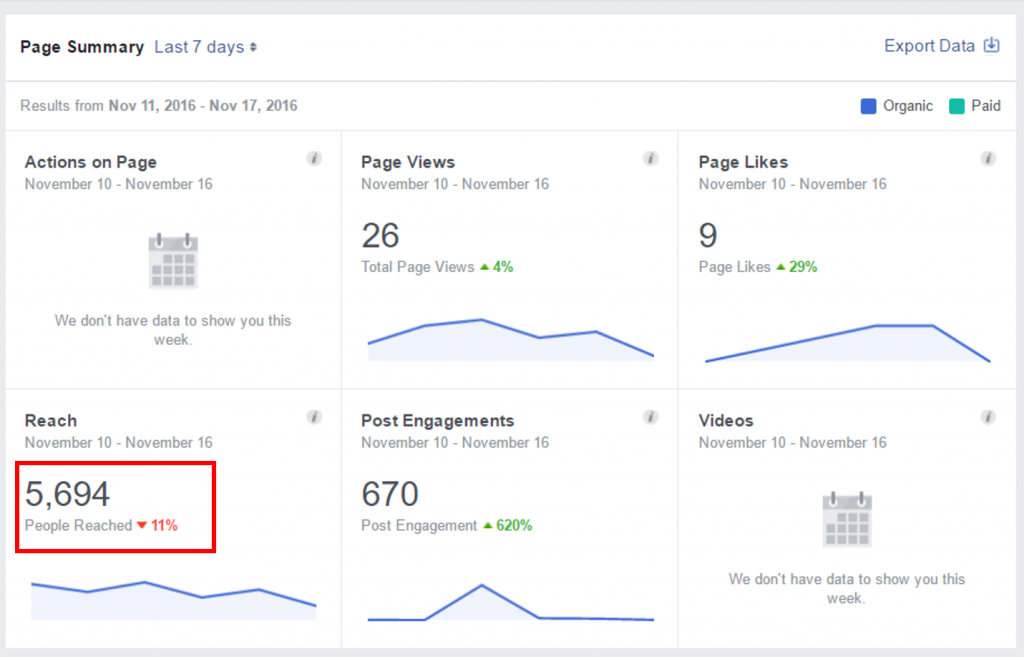Original source: http://www.wordstream.com/blog/ws/2016/11/18/facebook-organic-reach-misreported
Two months after Facebook announced it had been overestimating average view time for videos, the social network let out that it found four more discrepancies in performance metrics relied on by digital marketers and advertisers.
The most glaring of these miscalculations is how organic reach has been overrepresented in the Page Insights dashboard. Per the Wall Street Journal:
Facebook found that it had been overcounting how many people were exposed to marketers’ organic posts, meaning regular posts that weren’t paid ads, because it was adding up the daily reach over certain periods without accounting for repeat visitors. The corrected metric on average will be about 33% lower for the seven-day period and 55% lower for the 28-day period, Facebook said.
The issue, which has been present since May of this year, was discovered after an internal review of Facebook’s advertising and performance metrics. In an attempt to subdue the concerns of many, Facebook announced that it would “double-down” on additional third-party reviews and validation of its data. Still, this does not help businesses who are solely operating on Facebook organically. They now must deal with the fact that their audience may be less than half of what they thought it was.

Organic reach, outlined in red, is over estimated by 50% when looking at the last 7 days, and 100% across a four-week span (28 days)
It Gets Worse…
In addition to coming clean about these reporting errors, Facebook also announced that it will be introducing a stricter definition to organic reach in the coming months. As it stands, reach includes users who had a post in their newsfeed even if a user never scrolled far enough to actually view the post.

That’s right, your organic reach includes people who haven’t even seen your posts! In an effort to improve the transparency of this metric, Facebook will be adjusting organic reach counts to go off of “viewable impressions,” only counting reach when a unique user sees a post on their screen. This is the same way Facebook currently determines the reach of paid content, so the change will create parity between how the two are reported. The result of this change? Reported organic reach is expected to drop an additional 20% on average. To be clear, this does not mean that you will reach 20% fewer people. Instead, it is just a more accurate reflection of your actual audience size.
To help marketers stay on top of all the upcoming reporting adjustments, Facebook has launched a new blog series, Metrics FYI.
Lessons Learned?
Before your start preparing a “brace yourself” speech for your boss or clients, let’s take a look at some lessons learned from this new revelation.
Lesson 1: Organic Posting Is the Least You Can Do
Literally. We already knew that organic reach on Facebook is abysmal. If you are still gung-ho about posting organic content, don’t let this stop you, just know that your reach can be well below 5 percent of page fans. Organic posts are a great way to make sure your business page stays fresh, but other than that, it’s a bit like yelling in an empty room.
Lesson 2: It’s Time to Start Boosting Posts
If posting organically is the least you can do, the next best thing would be boosting those same posts. Boosting allows you to expand the reach of your organic posts by putting a little money behind them. There’s no need to boost everything. Just pick a few that have the best engagement, and give them the nudge they so desperately want.
Lesson 3: You Have to Pay to Play
You knew this was coming, didn’t you? Facebook has approximately 4 million advertisers with a growth rate of 50% in the last year. That being said, the cost-per-click is still well below AdWords. If you haven’t already joined the movement, consider this a wake-up call.
Original source: http://www.wordstream.com/blog/ws/2016/11/18/facebook-organic-reach-misreported